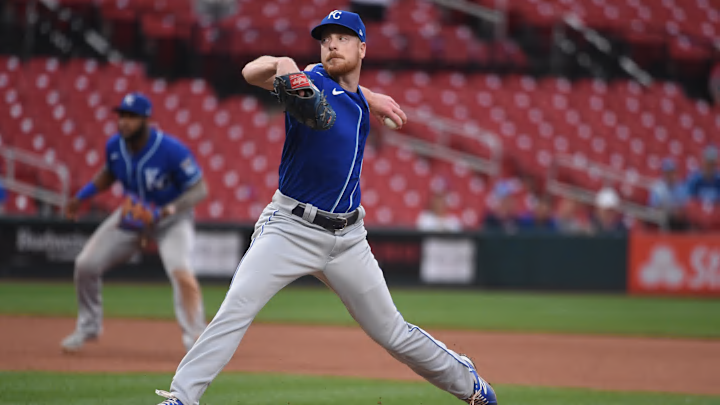Few outside the front office probably foresaw the Opening Day pitching move the KC Royals made just hours before Zack Greinke threw the first pitch of this season. The Royals shipped lefthanded reliever Richard Lovelady, a member of the organization since 2016, to Atlanta in a strictly cash-for-player deal.
The deal's timing wasn't the only reason it caught folks off guard. Combined with the nice late-season minor league rehab assignment he undertook last season while recovering from Tommy John Surgery (nine strikeouts and one walk in four innings), Lovelady's Cactus League effort this spring—he struck out 10 and didn't walk anyone in eight scoreless innings—seemed to make him a lock for KC's Opening Day roster.
The Royals obviously didn't see it that way; while his suddenly-former teammates prepared for their first game, Lovelady headed for Atlanta and an assignment to Triple-A Gwinnett.
In Kansas City, Royals general manager J.J. Picollo seemed to suggest his club's stock of lefty pitchers and the need to open roster space as reasons for the trade. Now, almost three weeks later, would Picollo make the same deal?
The KC Royals could probably use the lefthanded reliever they traded away
Saturday night's KC-Atlanta game was still a game after seven innings—although the Royals fell behind early, the run they scored in the sixth brought them within two at 5-3. Ryan Yarbrough, one of those lefties the club had when it traded Lovelady, followed his scoreless sixth with another shutout inning in the seventh and, other than hitting a batter and giving up a single, appeared in control.
Then came the seventh. With one out, Yarbrough yielded successive singles to Kevin Pillar and Eli White, uncorked a wild pitch that allowed Pillar to take third and White second, hit Ronald Acuña Jr., and walked Matt Olson to score Pillar and expand Atlanta's lead to three. The mess was too much for Carlos Hernández, who immediately relieved Yarbrough and allowed two of the three runners he inherited to score. In the end, Yarbrough was charged with four runs in 2,1 innings; the Royals lost 9-3.
Unfortunately, Saturday's appearance wasn't Yarbrough's first untidy outing of this still-young season; instead, it marked the third time in six games he's surrendered two or more runs, and he's twice done it in less than two innings. And it was Yarbrough who gave up the three eighth-inning runs that allowed San Francisco to score the come-from-behind win last Sunday that ruined Kansas City's bid for a series sweep of the Giants. His ERA is now 9.00.
Impossible to know is whether Lovelady would have been better, but it's worth noting that while he was fanning those 10 batters in eight scoreless innings this spring, Yarbrough gave up four runs in seven frames. (In fairness, Yarbrough did have a groin strain during spring training).
Yarbrough is one of the lefthanders Picollo presumably referenced in his remarks about the Lovelady trade and one of the three southpaws currently in manager Matt Quatraro's bullpen. The trio may not last the season—too many more bad outings could spell the end of Yarbrough's Kansas City stay, Aroldis Chapman is an ideal trade candidate, and Garrett may well find himself on the block come July.
And what of Lovelady? He'd given up a run in 4.1 innings at Gwinnett before Tuesday, when he surrendered three in two-thirds of a frame. Then, in a transaction as out-of-the-blue as the Opening Day deal that made him a Brave, Lovelady was headed for Oakland Thursday after the A's claimed him off waivers.
All, though, may not be what it seems—Atlanta may not have wanted to lose Lovelady at all. House that Hank Built, our sister FanSided site covering all things Braves, suggested the club was trying to get him through waivers but Oakland claimed him; had the move worked, the Braves could have kept Lovelady in Gwinnett without it costing them the 40-man roster spot he occupied after the trade with Kansas City.
Whether the Royals had any interest in reacquiring Lovelady is unknown. He and the club have a curious history, one featuring excellent minor league pitching but only one good turn in the majors, a 2-0, 3.48 ERA, 20-game effort in 2021 before his UCL injury ended his season prematurely.
But it probably doesn't matter, especially after Oakland claimed him Thursday. Although Lovelady is a reliever the Royals could use now or later in the season, and might in hindsight have kept, getting him back now will cost them something.
All things considered, Lovelady's is a trade the Royals probably shouldn't have made.
